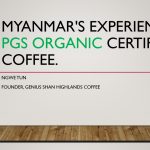
36 downloads
Title of document: Myanmar's Experience in PGS Organic Certified Coffee Authors: NGWE TUN Journal’s name if any: Ministry/Government Agency/Organisation: GENIUS SHAN HIGHLANDS COFFEE Year of publication: 2018 Geographic focus: Myanmar Main issues / topics addressed (for example: Introduction Genius Shan Highlands Coffee; Facts & Figure; Products; Challenges; Future Plan …) School of agroecology (if any): Web address to original document (if any): Summary: The presentation for Regional experience sharing workshop “Participatory Guarantee Systems (PGS) to promote agroecology in the Mekong Region” 1st to 3rd October 2018, Vientiane Capital, Lao PDR. Read More
33 downloads
Title of document: Presentations from the 4th Annual Meeting of The Mekong Extension Learning Alliance (MELA), 20-24 August 2018, Thailand Authors: MELA Journal’s name if any: Ministry/Government Agency/Organisation: SDC, Helvetas, MELA Year of publication: 2018 Geographic focus: SEA Main issues / topics addressed (for example:…) School of agroecology (if any): Web address to original document (if any): Summary: MELA is an alliance formed to provide a forum for exchanges of agriculture extension and other important information on rural development in the Mekong region. The mission of MELA is to be a network for all stakeholders in agriculture and rural development in the Mekong Region to continuously learn and share knowledge and best practices with each other and from outside sources in advisory services for sustainable agriculture, marketing and rural development. The Fourth MELA meeting has been held from 20-24 August 2018 in Nonthaburi, Thailand Read More
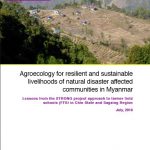
34 downloads
Title of document: Case study one “Agroecology for resilient and sustainable livelihoods of natural disaster affected communities in Myanmar: Lessons from the STRONG project approach to farmer field schools (FFS) in Chin State and Sagaing Region” Authors: Ar Yone Oo-SDA and Chalmers University of Technology Journal’s name if any: Ministry/Government Agency/Organisation: Ar Yone Oo-SDA, Chalmers University of Technology, GRET/ALiSEA Year of publication: 2018 Geographic focus: Myanmar Main issues / topics addressed (for example: Reasons to promote agroecology for disaster affected communities; How do disaster affected communities learn about agroecology?; Promoted practices: Agroecology for productive crops and fertile soils……) School of agroecology (if any): Web address to original document (if any): Summary: This brief (i) provides an introduction to the STRONG project approach to adult learning in FFS, (ii) documents agroecological practices that the initiative promotes in target communities and (iii) presents key insight from the STRONG project for inter-organisational learning and knowledge exchange. The presentation builds on results of a collaboration between Ar Yone Oo (Myanmar) and Chalmers University of Technology (Sweden), formed to document lessons from the STRONG project implementation process, and assess project beneficiaries’ experiences with promoted agroecological practices Read More
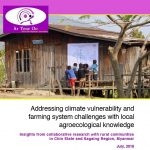
18 downloads
Title of document: Addressing climate vulnerability and farming system challenges with local agroecological knowledge: Insights from collaborative research with rural communties in Chin State and Sagaing Region, Myanmar Authors: Ar Yone Oo-SDA and Chalmers University of Technology Journal’s name if any: Ministry/Government Agency/Organisation: Ar Yone Oo-SDA, Chalmers University of Technology, GRET/ALiSEA Year of publication: 2018 Geographic focus: Myanmar Main issues / topics addressed (for example:……) School of agroecology (if any): Web address to original document (if any): Summary: This brief presents such an approach and insights from research collaboration between Ar Yone Oo – Social Development Association (Myanmar) and Chalmers University of Technology (Sweden). These organisations partnered in 2017, to document lessons from Ar Yone Oo’s STRONG project activities for disaster affected communities in northern Chin State and western Sagaing Region [3]. The initiative also conducted participatory research, to assess climate vulnerabilities and farming system challenges that project beneficiaries encounter. Insights from this collaboration can inform inter-organisational learning and knowledge sharing for rural development and agroecological initiatives in Myanmar, and across the region Read More
8 downloads
Title of document: Organic Directory in Myanmar Authors: Journal’s name if any: Ministry/Government Agency/Organisation: Year of publication: Geographic focus: Myanmar Main issues / topics addressed (for example:…) School of agroecology (if any): Web address to original document (if any): Summary: Read More
33 downloads
Title of document: Posters “CORAD Chin State Myanmar” Authors: CORAD Journal’s name if any: Ministry/Government Agency/Organisation: CORAD Year of publication: Geographic focus: Myanmar Main issues / topics addressed (for example:…) School of agroecology (if any): Web address to original document (if any): Summary: 8 Posters of CORAD Chin State Myanmar Read More
17 downloads
Title of document: Factors Affecting the Decision-Making of Farmers on Rice Storage in Selected Areas of Ayeyarwaddy Region, Myanmar Authors: Yin Yin Nwet, Flordeliza A. Lantican, Corazon T. Aragon, Zenaida M. Sumalde Journal’s name if any: Ministry/Government Agency/Organisation: MOALI Year of publication: 2017 Geographic focus: Myanmar Main issues / topics addressed (for example: Introduction; Review of Literature; Theoretical and Conceptual Framework; Methodology; Results and Discussion …) School of agroecology (if any): Web address to original document (if any): Summary: Storage is an important component of the postharvest handling operations of agricultural products. Identification of the postharvest activities in rice farmers has been the focus of continuing study by agricultural economists. However, the individual characteristics and other socioeconomic factors that affect the farmers’ decisions on rice storage are not well understood, especially in Myanmar. This study examines the factors affecting the decision making of farmers on rice storage in Pyar Pon District, Myanmar. Qualitative choice model (binomial logit) was used to determine whether farmers’ choices of storing and non-storing options were significantly affected by their individual characteristics and other socio-economic factors. The factors found to be significantly affecting the farmer’s decision on rice storage were price of rice after storage, storage costs, education, and availability of equipment. Other factors like rice production, annual gross income, experiences in rice trading and gender were insignificant. Read More
4 downloads
Title of document: Rice Seed Marketing and Distribution Situation along Supply Chains ofLower Myanmar Authors: Thanda Kyi and Zar Ni Hlaing Journal’s name if any: Ministry/Government Agency/Organisation: MOALI Year of publication: Geographic focus: Myanmar Main issues / topics addressed (for example: Introduction; Results and Discussion; Conclusion; Policy Implication…) School of agroecology (if any): Web address to original document (if any): Summary: This study attempted to explore the marketing and distribution situation in the supply chain of rice seed in lower Myanmar. The survey was conducted from September to October, 2015. The stratified random sampling method was used to select the seed growers, seed dealers and farmers. Read More
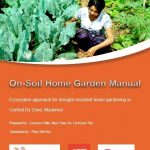
94 downloads
Title of document: On-Soil Home Garden Manual: Ecosystem approach for drought resistant home gardening in Central Dy Zone, Myanmar _ Version English and Myanmar Authors: Lorenzo Fellin, Moe Thae Oo, Lin Kyaw Thu Journal’s name if any: Ministry/Government Agency/Organisation: TDH, GRET/ALiSEA, AFD Year of publication: 2018 Geographic focus: Myanmar Main issues / topics addressed (for example: Home garden design and construction; Conservative Practices; Crop Plan; Garden Management…) School of agroecology (if any): Web address to original document (if any): Summary: Climate and soil type in the Dry Zone makes vegetable cultivation and availability extremely difficult, during the dry season and not only. From December to April most farmers of the area can only wait until the rainy season to begin cultivation of main crops, such as Pigeon Pea, Mung Bean, Sesame and Groundnut. However, the nutritional input given by fresh and green vegetable is often insufficient. The situation is worsened by climate change and the tendency of farmers to rely on extensive agriculture based on chemical input. While this approach might give initial benefits on productivity, it is highly unsustainable and deepens the environmental problems of the area (soil erosion, loss and desertification). However, thanks to the right techniques and conservative practices is possible to: cultivate all year round without relying on excessive chemical inputs; improve nutritional intake and decrease expenses on food. This has been the aim of ALiSEA project Ecosystem approach for drought resistant home gardening in Central Dry Zone implemented by TDH Italy: improving the livelihood of the beneficiaries through sustainable home garden vegetable production. The purpose of the following handbook is to provide the necessary information for the construction and management of a home garden using agroecological practices Read More
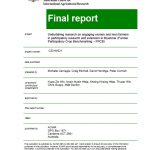
5 downloads
Title of document: Undertaking research on engaging women and men farmers in participatory research and extension in Myanmar (Farmer Participatory Crop Benchmarking – FPCB) Authors: Kyaw Zin Win, Nyein Nyein Htwe, Khaing Khaing Htwe, Thuzar Win, Chris Guppy, Matt Denton Journal’s name if any: Ministry/Government Agency/Organisation: ACIAR Year of publication: Geographic focus: Myanmar Main issues / topics addressed (for example: Background; Objectives; Methodology; Achievements against activities and outputs/milestones; Key results and discussion…) School of agroecology (if any): Web address to original document (if any): Summary: The Farmer Participatory Crop Benchmarking (FPCB) study was implemented as an 18-month pilot study in Magwe township in the Central Dry Zone and is the first of its kind in Myanmar. The farmer-participatory benchmarking provided both a methodology for developing scientific understanding on soil and crop management, and for developing a participatory adult-learning approach to extension. The project involved three key stakeholders, farmers, extension workers and research scientists, working together to identify constraints to crop yield and thereby raise productivity. Read More

 Asia & Mekong Region
Asia & Mekong Region  Cambodia
Cambodia  Laos
Laos  Myanmar
Myanmar  Other
Other  Vietnam
Vietnam